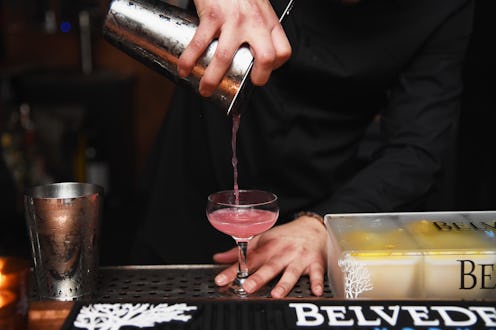
While you might feel like a dishrag after one shot of liquor, you likely have a friend who can drink nothing but tequila and wake up totally fine the next morning. Well, you can officially blame it on your genes because human evolution could be making your hangovers worse, according to new research published in the journal Ecology & Evolution. Previous studies have explored the phenomenon known as alcohol flush in people of Asian decent, but researchers at the University of Pennsylvania have noted that other populations are developing genetic adaptations that could make them alcohol intolerant.
These people may have "reduced tolerance to alcohol in today's environment," senior investigator of the study Benjamin Voight, an associate professor of genetics at the University of Pennsylvania's Perelman School of Medicine, told Live Science. So, if you can't hold you liquor, you can thank your ancestors. On the upside, populations that do have the genetic adaption are less likely to become dependent on alcohol, according to the study, so there's that. Voight told Live Science that researchers investigated the gene adaptation by analyzing data from the 1,000 Genome Project, which has collected genomes (genetic material) from 2,500 people in 26 different population across four continents.
The highest number of people with the gene adaptation are from West African and East Asian populations, the study reported. These populations have developed a gene adaptation that doesn't allow their bodies to break down alcohol in the same way as other populations. And, not being able to break down alcohol is what makes you feel like you've been hit by a bus after a night of drinking.
When you drink alcohol, it's quickly converted to acetaldehyde, a toxic compound that induces hangovers, USC Health reported. For most people, acetaldehyde converts to water and is expelled from the body through urine. For others, it sticks around in their livers and makes them feel hungover. "This is their body telling them to stop drinking immediately," Sean Nordt, a toxicologist and an associate professor of clinical emergency medicine at the Keck School of Medicine of USC, explained on USC Health. "I know it’s frustrating for people because it may be challenging being surrounded by people who drink often."
While this gene adaption might seem like a way to curb substance use disorder, which the National Institute of Drug Abuse reported is at least partially genetic, Voight told Newsweek that it's a little more complicated than that. "Alcohol dependence is a complex human trait — an individual's risk for alcohol dependence is a function of genetic background, environment, and behavior. So the contribution from this specific genetic change has to be viewed in the context of the myriad of other factors that perhaps contribute a lot more."
Additionally, evolution is a pretty slow process. Science magazine reported that some researchers speculate that humans may have been alcohol intolerant to begin with but started to develop a gene adaptation that allowed them to break it down more efficiently over 9,000 years ago when humans began eating fermented food, such as fruit that had fallen from trees. So, whether or not your ancestors consumed a lot of fermented fruit might determine if you developed a gene adaptation to tolerate alcohol or not. What's more, a 2011 study published in the journal Neuropsychopharmacology noted that people of European descent might be more alcohol tolerant because their bodies evolved to survive brutal winters, and alcohol actually helped them adapt.
"Thus, a preference for food with a higher fat and alcohol content would have been important for survival," the Guardian quoted Doctor Alasdair MacKenzie, lead study author from the University of Aberdeen in Scotland, as saying. "The negative effects of fat and alcohol we see today would not have mattered so much then as life expectancies were between 30 and 40 years."
People who evolved in warmer climates didn't need to worry about those wicked winters, and likely consumed less alcohol as a result. So, if you can't hang all night and get up and go to work the next day like a boss, it's not because you're not as hardcore as your friends. If you do have the genetic adaptation that makes it harder for your body to process alcohol, you're never going to be able to avoid hangovers. And, armed with that knowledge, it's much easier to turn down that shot of tequila.